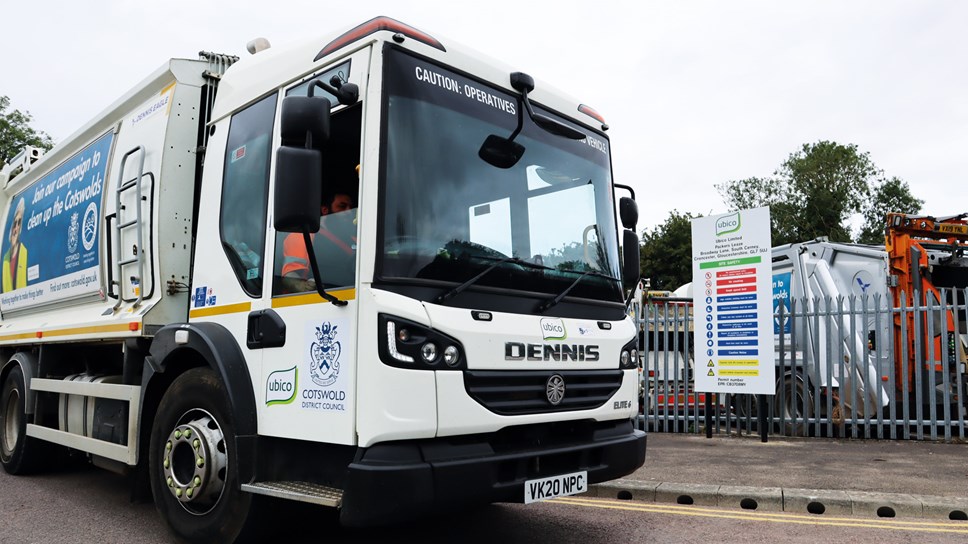
Council waste collectors at risk from lithium-ion batteries and needles
A fire in the back of a bin lorry, which required a call out by the Gloucestershire Fire and Rescue Service, is leading Cotswold District Council to highlight the risk of binning lithium-ion batteries as more and more fires are starting in waste vehicles and at rubbish sorting facilities across the country.
According to research by Materials Focus, the organisation behind the national Recycle Your Electricals campaign, more than 700 waste-related fires are responded to each year by the emergency services due to the unsafe disposal of batteries, many of which are hidden inside electrical and electronic equipment.
Councillor Mike Evemy, Cabinet Member with responsibility for waste and recycling at Cotswold District Council, said: “While we’ve been unable to establish the reason for the fire, it was probably started by a lithium-ion battery - the sort found in small rechargeable items such as toothbrushes, cameras and mobile phones. While most people only throw these items away every few years, the batteries are also used in single-use vapes. The sales of single-use vapes have risen dramatically in the last few years. Over 5 million e-cigarettes now end up in the UK’s litter bins and waste containers each week.
“Disposable vapes are a well-known hazard due to the vast numbers out there and their potential to ignite or explode if damaged by compacting equipment on the refuse lorries. Because of this, it’s really important that householders keep items containing a battery out of rubbish and litter bins and dispose of them responsibly. The best way to do this is through an in-store take-back scheme. By law, shops selling electrical and electronic items must offer a like-for-like take-back service so these products can be recycled safely and efficiently.”
Residents can also recycle their old electrical and electronic items using the Council’s fortnightly recycling service by popping them inside an old carrier bag, or smaller, and placing this inside either of their black kerbside recycling boxes ready for crews to collect.
“We are very grateful to the collection crew who took immediate action in raising the alarm and the two Gloucestershire Fire and Rescue Service crews who attended the scene at South Cerney, brought the fire under control and escorted the vehicle safely back to the waste transfer station so the situation could be monitored. Thankfully everyone was unharmed but the outcome could have been much worse. Incidents like this are far and few between but are a sobering reminder of the very real risk these items pose to the safety of crews and waste collection vehicles.”
In a second unrelated incident, a waste crew working on their recycling route discovered a sharps bucket, filled with hypodermic needles, in amongst the bag of plastic recycling they were tipping by hand. Under no circumstances should needles or lancets be disposed of in the general household waste or recycling.
Anyone who has a filled sharps box to dispose of should seal it first before taking it to their GP surgery or one of the pharmacies participating in Gloucestershire County Council’s syringe take-back scheme. The list of pharmacies participating in the scheme can be found on the Gloucestershire Recycles website: What can you recycle at the HRCs? | Gloucestershire Recycles
Details of Cotswold District Council’s kerbside recycling services can be found at: Bins and recycling - Cotswold District Council.
Contact Information
Cotswold District Council Communications Team
Notes to editors
- Electrical and electronic can also be taken to the Fosse Cross Household Recycling Centre for recycling in the dedicated bins.
- Stores that sell over 32kg of batteries a year (the equivalent of one pack of 4 AA batteries per day) legally have to provide a collection point for recycling on their premises. By law, any shop selling electrical and electronic items must offer a like-for-like take-back service so these can be disposed of safely. Shops that have a sales area greater than 400 square metres must also take back very small WEEE items (classed as items less than 25 cms on their longest side). This service must be provided for free, regardless of whether a customer has bought anything from the store.
- Lithium-ion batteries are safe if used normally but care should be taken not to over-charge them, damage them or submerge them in water.
